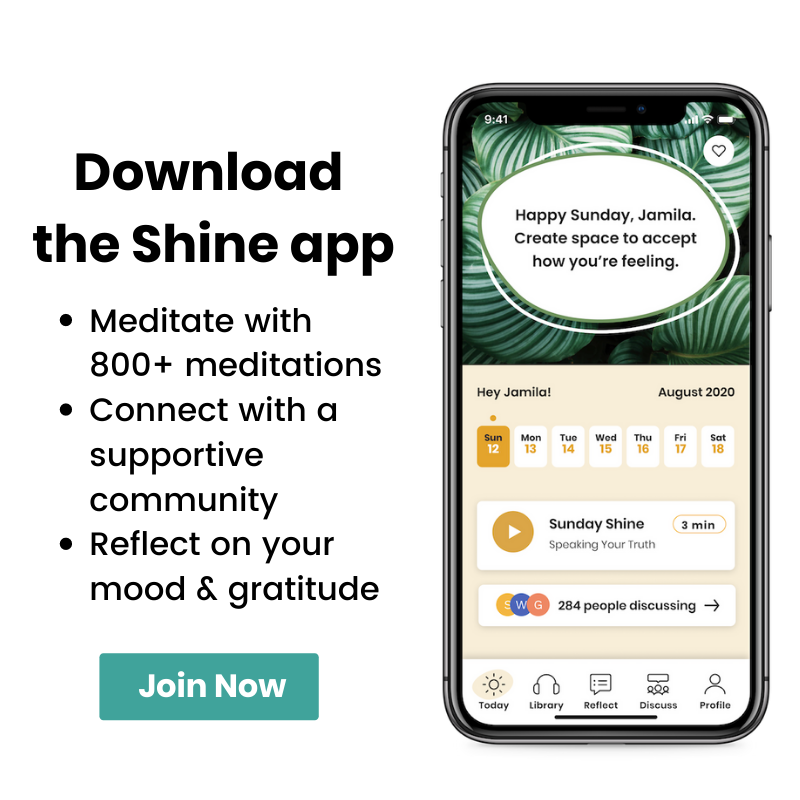Why Representation in Mental Health—And Meditation—Matters
"It’s a lot. You’re gonna be really tired at the end of the year. But I promise, you got this.”
The woman sitting across the table from me in our university coffee shop, wearing her best business-casual-meets-college-chic, radiated warmth and an ambitious (caffeinated) energy as she finished her pep talk and plopped onto the table a huge folder containing the responsibilities she was transferring to me as vice president of our school’s PR club.
Erica Smith was a year ahead of me and was one of the few Black women in my school’s PR department. She was a force—driven, smart, kind, and always striving to be better. Since the moment I’d met her as a freshman, she had taken me under her wing and made sure I got the support I needed.
This Black History Month, I’m thinking a lot about Erica—and the power of representation.
I remember gravitating toward Erica in college because she looked like me, but also because she got me. In an environment that often made both of us feel like outsiders, we had a shared shorthand. There were certain things we just didn’t have to explain.
Because of the safety I felt in our relationship, I stood taller, I went for positions I wouldn’t have, studied harder, and felt more mentally balanced in my higher education experience.
Imagine that.
Just seeing myself represented in one person shifted my educational journey, gave me more confidence, boosted my career opportunities—and, ultimately, changed my life.
So many of us know how powerful representation can be. Whether it’s a fictional character, a family member, or someone in the spotlight we’ve never met—those of us who have been marginalized, excluded, or traumatized by society know just how much it means to simply see yourself in someone else.
Whether it’s a fictional character, a family member, or someone in the spotlight we’ve never met—those of us who have been marginalized, excluded, or traumatized by society know just how much it means to simply see yourself in someone else.
But, as we all know too well, most areas of our society still lack adequate representation—especially mental health.
When we started Shine in 2016, we looked at all of the available meditation apps in the App Store and Google Play and couldn’t find one that adequately represented or centered Black and Brown voices.
Black Americans are 20% more likely to experience psychological distress, often in acute ways like racial battle fatigue, yet we have significantly lower rates of receiving care than our white counterparts.
Only 30% of Black people with mental illness receive treatment each year, compared to the U.S. average of 43%.
One of the biggest reasons why: A lack of representation.
In 2015, only 4% of psychologists in the U.S. were Black. In 2019, of all of the books published in the U.S., just 5% were written by Black authors—and yes, there’s a gap across new-age mental health solutions like meditation apps, too.
At Shine, the majority of our content is voiced and created by Black women because we believe that when we tell our stories and represent the most marginalized in our society, everyone’s self-care experience is elevated—either because we’re addressing a person’s experiences, or because they are learning about someone else’s.
At Shine, the majority of our content is voiced and created by Black women because we believe that when we tell our stories and represent the most marginalized in our society, everyone’s self-care experience is elevated.
It’s a mission born from my own needs.
Navigating my own mental health has been a constant uphill battle. As a kid with a complicated family dynamic who grew into an adult that had never dealt with past trauma, I’d always been a walking case study for someone who could really use a therapist and a solid self-care routine.
After experiencing a bout of depression in my early 20s, I finally went on a hunt to get the care I needed—but it was a struggle.
I found some therapists I liked, but often felt that they couldn’t really identify with my issues. I read through every self-help book I could find but never quite felt like the author was addressing the intersectionality of my experience.
I even tried meditation apps, but found that they were just so one-dimensional. Nowhere I turned seemed to speak to me and my experiences with my mental health.
Ultimately, I did what so many Black Americans do: I used the tools I had available to me. While I didn’t always feel the sense of safety and belonging that I craved, they helped. Not as much as they could have if I had care that was culturally-relevant to my needs, but they helped.
Now, five years into the creation of Shine, and with a team that has taken our vision so much farther than we could have imagined, our product is, and has always been, on a mission of making navigating your emotional health easier, more representative and more inclusive than it’s ever been.
We created something that is by us, for everyone.
My favorite reviews tend to share the same words: “Finally” or “I feel seen” or “I didn’t know how much it would mean to hear a voice like mine.”
And we’re not alone. Organizations like Ethel’s Club, Therapy for Black Girls, Sad Girl’s Club, Black Girl in Om, The Loveland Foundation, and more are all co-leading this movement of prioritizing the representation of Black voices in mental health.
Twenty-year-old me, who was struggling with depression and couldn’t see herself represented in the world of wellness, would be so proud to be a part of this coalition today.
I like to think my friend Erica would be proud too.
After college, Erica went on to create an organization called The BW Factor, focused on “helping Black and Brown mid-level corporate women succeed all the way up to the C-Suite.”

Throughout her career, through every channel she could, she fought to make the spaces she entered more representative and inclusive.
Sadly, the world lost my beautiful, brilliant friend, Erica Smith last year.
I’d give anything for another coffee shop pep talk with her, or even just a hug. But her impact on me is lifelong. I’ll always know what it feels like to feel seen and to have someone who has my back when we both felt like outsiders.
My only hope is to give the gift that she gave me to others.
This Black History Month, I’m proud to carry on her legacy by helping others see themselves in Shine or in my experiences, and for them to know that they are never alone in what they’re going through.
Read Next: Shine Stands in Solidarity With Black Lives Matter

Shine is supported by members like you. When you buy through links on our site, we may earn an affiliate commission. See our affiliate disclosure for more info.


